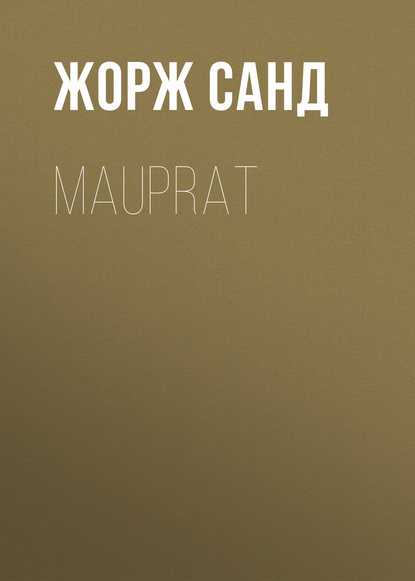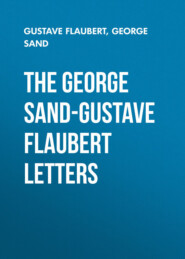По всем вопросам обращайтесь на: info@litportal.ru
(©) 2003-2025.
✖
Mauprat
Настройки чтения
Размер шрифта
Высота строк
Поля
“You know,” continued the abbe, “that I do not like monks, that I distrust their humility and abhor their lives of inaction. But this man spoke in so sad and kindly a manner; he was so filled with a sense of his duty; he seemed so ill, so emaciated by asceticism, so truly penitent, that he won my heart. In his looks and in his talk were bright flashes which betrayed a powerful intellect, indefatigable energy, and indomitable perseverance. We spent two whole hours together, and I was so moved by what he said that on leaving him I expressed a wish to see him again before he left this neighbourhood. He had found a lodging for the night at the Goulets farm, and I tried in vain to persuade him to accompany me to the chateau. He told me that he had a companion he could not leave.
“‘But, since you are so sympathetic,’ he said, ‘I shall esteem it a pleasure to meet you here to-morrow towards sunset; perhaps I may even venture to ask a favour of you; you can be of service to me in an important matter which I have to arrange in this neighbourhood; more than this I cannot tell you at the present moment.’
“I assured him that he could reckon on me, and that I should only be too happy to oblige a man such as himself.”
“And the result is, I suppose, that you are waiting impatiently for the hour of your appointment?” I said to the abbe.
“I am,” he replied; “and my new acquaintance has so many attractions for me that, if I were not afraid of abusing the confidence he has placed in me, I should take Edmee to the spring of Fougeres.”
“I fancy,” I replied, “that Edmee has something better to do than to listen to the declamations of your monk, who perhaps, after all, is only a knave, like so many others to whom you have given money blindly. You will forgive me, I know, abbe; but you are not a good physiognomist, and you are rather apt to form a good or bad opinion of people for no reason except that your own romantic nature happens to feel kindly or timidly disposed towards them.”
The abbe smiled and pretended that I said this because I bore him a grudge; he again asserted his belief in the Trappist’s piety, and then went back to botany. We passed some time at Patience’s, examining the collection of plants; and as my one desire was to escape from my own thoughts, I left the hut with the abbe and accompanied him as far as the wood where he was to meet the monk. In proportion as we drew near to the place the abbe seemed to lose more and more of his eagerness of the previous evening, and even expressed a fear that he had gone too far. This hesitation, following so quickly upon enthusiasm, was very characteristic of the abbe’s mobile, loving, timid nature, with its strange union of the most contrary impulses, and I again began to rally him with all the freedom of friendship.
“Come, then,” he said, “I should like to be satisfied about this; you must see him. You can study his face for a few minutes, and then leave us together, since I have promised to listen to his secrets.”
As I had nothing better to do I followed the abbe; but as soon as we reached a spot overlooking the shady rocks whence the water issues, I stopped and examined the monk through the branches of a clump of ash-trees. Seated immediately beneath us by the side of the spring, he had his eyes turned inquiringly on the angle of the path by which he expected the abbe to arrive; but he did not think of looking at the place where we were, and we could examine him at our ease without being seen by him.
No sooner had I caught sight of him than, with a bitter laugh, I took the abbe by the arm, drew him back a short distance, and, not without considerable agitation, said to him:
“My dear abbe, in bygone years did you never catch sight of the face of my uncle, John de Mauprat?”
“Never, as far as I know,” replied the abbe, quite amazed. “But what are you driving at?”
“Only this, my friend; you have made a pretty find here; this good and venerable Trappist, in whom you see so much grace and candour, and contrition, and intelligence, is none other than John de Mauprat, the Hamstringer.”
“You must be mad!” cried the abbe, starting back. “John de Mauprat died a long time ago.”
“John Mauprat is not dead, nor perhaps Antony Mauprat either; and my surprise is less than yours only because I have already met one of these two ghosts. That he has become a monk, and is repenting for his sins, is very possible; but alas! it is by no means impossible that he has disguised himself in order to carry out some evil design, and I advise you to be on your guard.”
The abbe was so frightened that he no longer wanted to keep his appointment. I suggested that it would be well to learn what the old sinner was aiming at. But, as I knew the abbe’s weak character, and feared that my Uncle John would manage to win his heart by his lying confessions and wheedle him into some false step, I made up my mind to hide in a thicket whence I could see and hear everything.
But things did not happen as I had expected. The Trappist, instead of playing the politician, immediately made known his real name to the abbe. He declared that he was full of contrition, and that, as his conscience would not allow him to make the monk’s habit a refuge from punishment (he had really been a Trappist for several years), he was about to put himself into the hands of justice, that he might atone in a striking way for the crimes with which he was polluted. This man, endowed as he was with conspicuous abilities, had acquired a mystic eloquence in the cloister. He spoke with so much grace and persuasiveness that I was fascinated no less than the abbe. It was in vain that the latter attempted to combat a resolution which appeared to him insane; John Mauprat showed the most unflinching devotion to his religious ideas. He declared that, having committed the crimes of the old barbarous paganism, he could not ransom his soul save by a public expiation worthy of the early Christians.
“It is possible,” he said, “to be a coward with God as well as with man, and in the silence of my vigils I hear a terrible voice answering to my tears: ‘Miserable craven, it is the fear of man that has thrown you upon the bosom of God, and if you had not feared temporal death, you would never have thought of life eternal!’
“Then I realize that what I most dread is not God’s wrath, but the rope and the hangman that await me among my fellows. Well, it is time to end this sense of secret shame; not until the day when men crush me beneath their abuse and punishment shall I fell absolved and restored in the sight of Heaven; then only shall I account myself worthy to say to Jesus my Saviour: ‘Give ear to me, innocent victim, Thou who heardest the penitent thief; give ear to a sullied but contrite victim, who has shared in the glory of Thy martyrdom and been ransomed by Thy blood!’”
“If you persist in your enthusiastic design,” said the abbe, after unsuccessfully bringing forward all possible objections, “you must at least let me know in what way you thought I could be of service to you.”
“I cannot act in this matter,” replied the Trappist, “without the consent of a young man who will soon be the last of the Mauprats; for the chevalier has not many days to wait before he will receive the heavenly reward due to his virtues; and as for myself, I cannot avoid the punishment I am about to seek, except by falling back into the endless night of the cloister. I speak of Bernard Mauprat; I will not call him my nephew, for if he heard me he would blush to think that he bore this shameful title. I heard of his return from America, and this news decided me to undertake the journey at the painful end of which you now behold me.”
It seemed to me that while he was saying this he kept casting side-glances towards the clump of trees where I was, as if he had guessed my presence there. Perhaps the movement of some branches had betrayed me.
“May I ask,” said the abbe, “what you now have in common with this young man? Are you not afraid that, embittered by the harsh treatment formerly lavished on him at Roche-Mauprat, he may refuse to see you?”
“I am certain that he will refuse; for I know the hatred that he still has for me,” said the Trappist, once more looking towards the spot where I was. “But I hope that you will persuade him to grant me an interview; for you are a good and generous man, Monsieur l’Abbe. You promised to oblige me; and, besides, you are young Mauprat’s friend, and you will be able to make him understand that his interests are at stake and the honour of his name.”
“How so?” answered the abbe. “No doubt he will be far from pleased to see you appear before the courts to answer for crimes which have since been effaced in the gloom of the cloister. He will certainly wish you to forego this public expiation. How can you hope that he will consent?”
“I have hope, because God is good and great; because His grace is mighty; because it will touch the heart of him who shall deign to hear the prayer of a soul which is truly penitent and deeply convinced; because my eternal salvation is in the hands of this young man, and he cannot wish to avenge himself on me beyond the grave. Moreover, I must die at peace with those I have injured; I must fall at the feet of Bernard Mauprat and obtain his forgiveness of my sins. My tears will move him, or, if his unrelenting soul despises them, I shall at least have fulfilled an imperious duty.”
Seeing that he was speaking with a firm conviction that he was being heard by me, I was filled with disgust; I thought I could detect the deceit and cowardice that lay beneath this vile hypocrisy. I moved away and waited for the abbe some distance off. He soon rejoined me; the interview had ended by a mutual promise to meet again soon. The abbe had undertaken to convey the Trappist’s words to me, while the latter had threatened in the most honeyed tone in the world to come and see me if I refused his request. The abbe and I agreed to consult together, without informing the chevalier or Edmee, that we might not disquiet them unnecessarily. The Trappist had gone to stay at La Chatre, at the Carmelite convent; this had thoroughly aroused the abbe’s suspicions, in spite of his first enthusiasm at the penitence of the sinner. The Carmelites had persecuted him in his youth, and in the end the prior had driven him to secularize himself. The prior was still alive, old but implacable; infirm, and withdrawn from the world, but strong in his hatred, and his passion for intrigue. The abbe could not hear his name without shuddering, and he begged me to act prudently in this affair.
“Although John Mauprat,” he said, “is under the bane of the law, and you are at the summit of honour and prosperity, do not despise the weakness of your enemy. Who knows what cunning and hatred may do? They can usurp the place of the just and cast him out on the dung-heap; they can fasten their crimes on others and sully the robe of innocence with their vileness. Maybe you have not yet finished with the Mauprats.”
The poor abbe did not know that there was so much truth in his words.
XIX
After thoroughly reflecting on the Trappist’s probable intentions, I decided that I ought to grant him the interview he had requested. In any case, John Mauprat could not hope to impose upon me, and I wished to do all in my power to prevent him from pestering my great-uncle’s last days with his intrigues. Accordingly, the very next day I betook myself to the town, where I arrived towards the end of Vespers. I rang, not without emotion, at the door of the Carmelites.
The retreat chosen by the Trappist was of those innumerable mendicant societies which France supported at that time. Though its rules were ostensibly most austere, this monastery was rich and devoted to pleasure. In that age of scepticism the small number of the monks was entirely out of proportion to the wealth of the establishment which had been founded for them; and the friars who roamed about the vast monasteries in the most remote parts of the provinces led the easiest and idlest lives they had ever known, in the lap of luxury, and entirely freed from the control of opinion, which always loses its power when man isolates himself. But this isolation, the mother of the “amiable vices,” as they used to phrase it, was dear only to the more ignorant. The leaders were a prey to the painful dreams of an ambition which had been nurtured in obscurity and embittered by inaction. To do something, even in the most limited sphere and with the help of the feeblest machinery; to do something at all costs – such was the one fixed idea of the priors and abbes.
The prior of the Carmelites whom I was about to see was the personification of this restless impotence. Bound to his great arm-chair by the gout, he offered a strange contrast to the venerable chevalier, pale and unable to move like himself, but noble and patriarchal in his affliction. The prior was short, stout, and very petulant. The upper part of his body was all activity; he would turn his head rapidly from side to side; he would brandish his arms while giving orders. He was sparing of words, and his muffled voice seemed to lend a mysterious meaning to the most trivial things. In short, one-half of his person seemed to be incessantly striving to drag along the other, like the bewitched man in the Arabian Nights, whose robe hid a body that was marble up to the waist.
He received me with exaggerated attention, got angry because they did not bring me a chair quickly enough, stretched out his fat, flabby hand to draw this chair quite close to his own, and made a sign to a tall, bearded satyr, whom he called the Brother Treasurer, to go out; then, after overwhelming me with questions about my journey, and my return, and my health, and my family, while his keen restless little eyes were darting glances at me from under eyelids swollen and heavy from intemperance, he came to the point.
“I know, my dear child,” he said, “what brings you here; you wish to pay your respects to your holy relative, to the Trappist, that model of faith and holiness whom God has sent to us to serve as an example to the world, and reveal to all the miraculous power of grace.”
“Prior,” I answered, “I am not a good enough Christian to judge of the miracle you mention. Let devout souls give thanks to Heaven for it. For myself, I have come here because M. Jean de Mauprat desires to inform me, as he has said, of plans which concern myself, and to which I am ready to listen. If you will allow me to go and see him – ”
“I did not want him to see you before myself, young man,” exclaimed the prior, with an affectation of frankness, at the same time seizing my hands in his, at the touch of which I could not repress a feeling of disgust. “I have a favour to ask of you in the name of charity, in the name of the blood which flows in your veins.”
I withdrew one of my hands, and the prior, noticing my expression of displeasure, immediately changed his tone with admirable skill.
“You are a man of the world, I know. You have a grudge against him who once was Jean de Mauprat, and who to-day is the humble Brother Jean Nepomucene. But if the precepts of our divine Master, Jesus Christ, cannot persuade you to pity, there are considerations of public propriety and of family pride which must make you share my fears and assist my efforts. You know the pious but rash resolution which Brother John has formed; you ought to assist me in dissuading him from it, and you will do so, I make no doubt.”
“Possibly, sir,” I replied very coldly; “but might I ask to what my family is indebted for the interest you are good enough to take in its affairs?”
“To that spirit of charity which animates all the followers of Christ,” answered the monk, with very well assumed dignity.
Fortified with this pretext, on the strength of which the clergy have always taken upon themselves to meddle in all family secrets, it was not difficult for him to put an end to my questions; and, though he could not destroy the suspicions which I felt at heart, he succeeded in proving to my ears that I ought to be grateful to him for the care which he had taken of the honour of my name. I wanted to find out what he was driving at; it was as I had foreseen. My Uncle John claimed from me his share in the fief of Roche-Mauprat; and the prior was deputed to make me understand that I had to choose between paying a considerable sum of money (for he spoke of the interest accruing through the seven years of possession, besides a seventh part of the whole estate) and the insane step he intended taking, the scandal of which could not fail to hasten the chevalier’s death and cause me, perhaps, “strange personal embarrassments.” All this was hinted with consummate skill under the cover of the most Christian solicitude for my own welfare, the most fervent admiration for the Trappist’s zeal, and the most sincere anxiety about the results of this “firm resolve.” Finally, it was made evident that John Mauprat was not coming to ask me for the means of existence, but that I should have to humbly beseech him to accept the half of my possessions, if I wished to prevent him from dragging my name and probably my person to the felon’s dock.
I tried a final objection.
“If,” I said, “this resolve of Brother Nepomucene, as you call him, is as fixed as you say; if the only one care he has in the world is for his own salvation, will you explain to me how the attractions of temporal wealth can possibly turn him from it? There seems to be a contradiction in this which I fail to understand.”
The prior was somewhat embarrassed by the piercing glance I turned on him, but he immediately started on one of those exhibitions of simplicity which are the supreme resource of rogues:
“Mon Dieu! my dear son,” he exclaimed, “you do not know, then, the immense consolation a pious soul can derive from the possession of worldly wealth? Just as perishable riches must be despised when they represent vain pleasures, even so must they be resolutely defended by the upright man when they afford him the means of doing good. I will not hide from you that if I were the holy Trappist I would not yield my rights to any one; I would found a religious society for the propagation of the faith and the distribution of alms with the wealth which, in the hands of a brilliant young nobleman like yourself, is only squandered on horses and dogs. The Church teaches us that by great sacrifices and rich offerings we may cleanse our souls of the blackest sins. Brother Nepomucene, a prey to holy fear, believes that a public expiation is necessary for his salvation. Like a devout martyr, he wishes to satisfy the implacable justice of men with blood. But how much sweeter for you (and safer, at the same time) to see him raise some holy altar to the glory of God, and hide in the blessed peace of the cloister the baleful lustre of the name he has already abjured! He is so much swayed by the spirit of his order, he has conceived such a love for self-denial, for humility and poverty, that it will need all my efforts and much help from on high to make him agree to this change of expiations.”
“It is you, then, prior, who from sheer goodness of heart are undertaking to alter this fatal resolution? I admire your zeal, and I thank you for it; but I do not think there will be any need of all these negotiations. M. Jean de Mauprat claims his share of the inheritance; nothing can be more just. Even should the law refuse all civil rights to a man who owed his safety only to flight (a point which I will pass over), my relative may rest assured that there would never be the least dispute between us on this ground, if I were the absolute possessor of any fortune whatever. But you are doubtless aware that I owe the enjoyment of this fortune only to the kindness of my great-uncle, the Chevalier Hubert de Mauprat; that he had enough to do to pay the debts of the family, which amounted to more than the total value of the estate; that I can alienate nothing without his permission, and that, in reality, I am merely the depositary of a fortune which I have not yet accepted.”
The prior stared at me in astonishment, as if dazed by an unexpected blow. Then he smiled with a crafty expression, and said:
“Very good! It appears that I have been mistaken, and that I must apply to M. Hubert de Mauprat. I will do so; for I make no doubt that he will be very grateful to me for saving his family from a scandal which may have very good results for one of his relatives in the next world, but which, for a certainty, will have very bad ones for another relation in the present world.”
“I understand, sir,” I replied. “This is a threat. I will answer in the same strain: If M. Jean de Mauprat ventures to importune my uncle and cousin, it is with me that he will have to deal; and it will not be before the courts that I shall summon him to answer for certain outrages which I have by no means forgotten. Tell him that I shall grant no pardon to the Trappist penitent unless he remains faithful to the role he has adopted. If M. Jean de Mauprat is without resources, and he asks my help, I may, out of the income I receive, furnish him with the means of living humbly and decently, according to the spirit of the vows he has taken; but if ecclesiastical ambition has taken possession of his mind, and he thinks, by stupid, childish threats, to intimidate my uncle to such an extent that he will be able to extort from him the wherewithal to satisfy his new tastes, let him undeceive himself – tell him so from me. The old man’s peace of mind and his daughter’s future have only myself as guardian, and I shall manage to guard them, though it be at the risk of my life and my honour.”

















